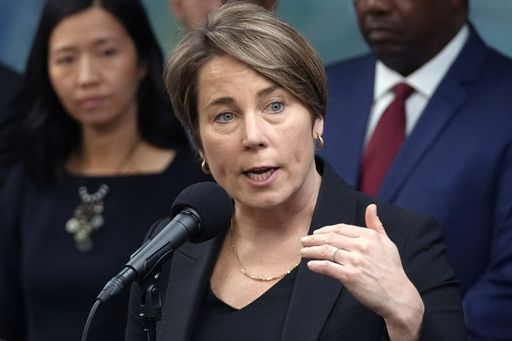BOSTON—Governor Maura Healey of Massachusetts announced plans on Friday to gradually end the state’s dependence on hotels and motels for sheltering homeless individuals, indicating new strategies for the emergency family shelter system over the next couple of years.
The Democratic governor stated that these adjustments aim to enhance the chances for families to secure stable, permanent housing while also managing financial expenditures. Healey highlighted that the number of families relying on emergency assistance has remained consistent at approximately 7,500, although the daily influx of families seeking shelter has recently decreased to between 15 and 18.
Healey remarked, “In recent years, the state’s family shelter system has grown to be increasingly unsustainable.” She added, “We’ve taken significant action to rein in its growth, and we’ve seen tangible results.”
Last year, she had declared a state of emergency that enforced a cap on shelter occupancy at 7,500 families. Additionally, the state prohibited families from spending the night at Logan International Airport in Boston.
The plan involves transitioning away from hotel and motel accommodations for the homeless during the fiscal years 2025 and 2026. Healey indicated that these types of facilities lack adequate space for essential services and can feel isolating. Support services will collaborate with families to secure safe and stable housing alternatives.
To further assist families, the administration intends to advocate for an increase in the state’s temporary rental assistance program. The proposed changes would allow families to receive rental assistance of up to $25,000 annually for a period of two years. Currently, families can access a maximum of $30,000 over two years or $45,000 over three years.
Starting on December 10, families without homes will be categorized into either the “Rapid Shelter Track” or the “Bridge Shelter Track” based on their specific needs, according to Healey.
The Rapid Shelter Track targets families capable of swiftly locating permanent housing, providing them with 30 days of support to facilitate this transition.
Conversely, the Bridge Shelter Track is designed for families facing more intricate challenges in securing permanent accommodation, including expectant mothers in late pregnancy and individuals with intellectual or developmental disabilities.
Gladys Vega, the president of La Colaborativa, an organization offering support to immigrants in Chelsea, Massachusetts, emphasized the importance of maintaining a safety net for those struggling to find affordable housing. She noted, “As rental prices continue to rise, families across the commonwealth are increasingly finding themselves unable to sustain the cost of housing. Many Massachusetts residents are just a single paycheck away from homelessness.”
The state has been grappling with a rise in demand for homelessness services, partly attributed to an influx of migrants.
In June, Healey declared that from August 1 onward, families not given priority for emergency assistance shelters could only utilize overflow accommodations for five days. She explained that restrictions on eligibility for the emergency assistance system were being tightened to address the ongoing capacity limitations and ensure the program’s financial viability.
Starting June 1, the state also initiated a policy to cap the duration for which homeless families can remain in shelters at nine months, after which they become eligible for two extensions, each lasting 90 days.
Copyright @2024 | USLive | Terms of Service | Privacy Policy | CA Notice of Collection | [privacy-do-not-sell-link]



